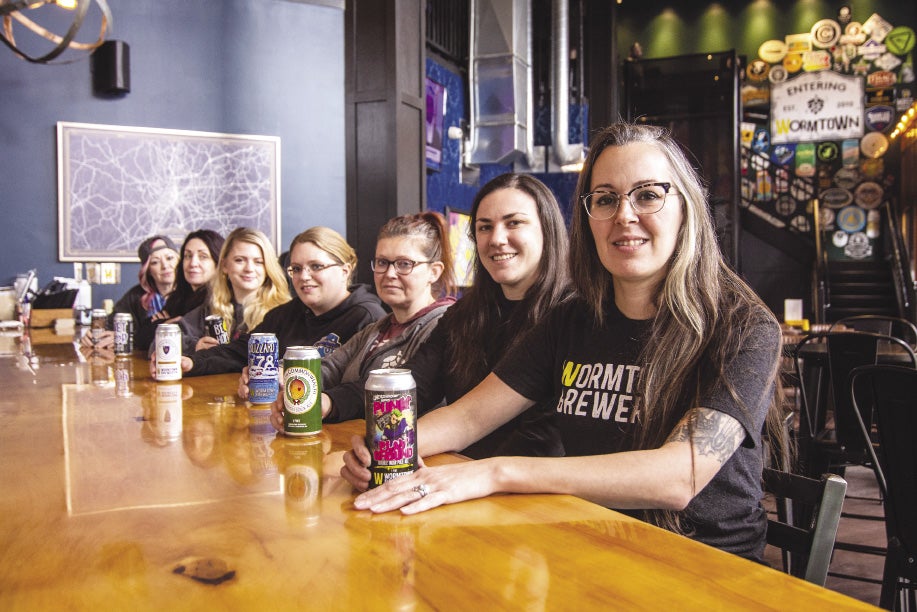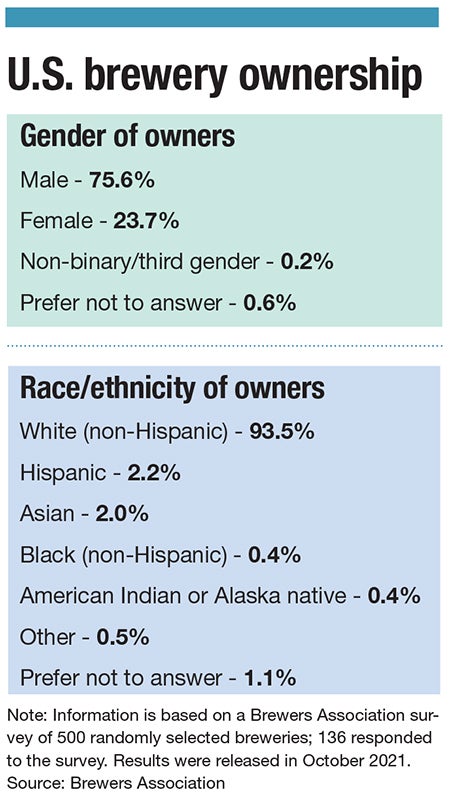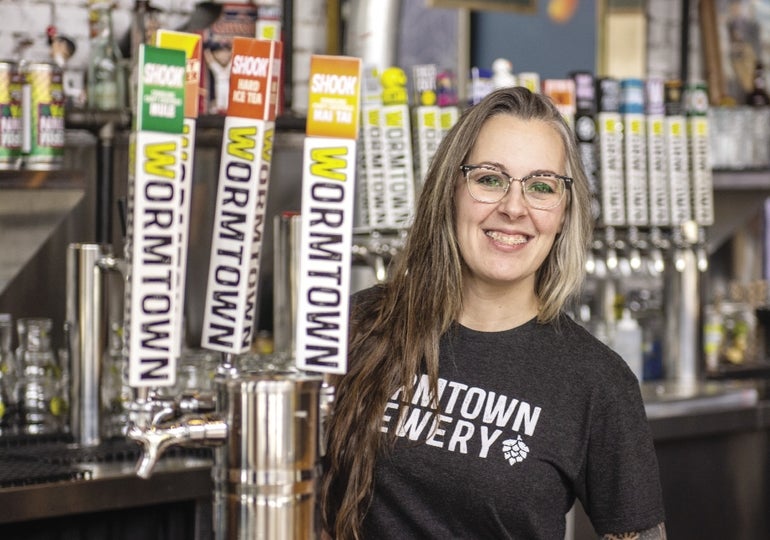In the wake of a scandal, Worcester’s largest brewer needed someone to show it how to be a great company. Kimberly Golinski answered the call.
Get Instant Access to This Article
Subscribe to Worcester Business Journal and get immediate access to all of our subscriber-only content and much more.
- Critical Central Massachusetts business news updated daily.
- Immediate access to all subscriber-only content on our website.
- Bi-weekly print or digital editions of our award-winning publication.
- Special bonus issues like the WBJ Book of Lists.
- Exclusive ticket prize draws for our in-person events.
Click here to purchase a paywall bypass link for this article.
Kimberly Golinski needed convincing.
She had a job she loved at Tree House Brewing Co. She was busy, productive, and could see the company continuing to grow, expanding from Monson to Charlton to Sandwich to Deerfield, Woodstock, and more. Since Golinski started at Tree House in 2013, she’d had her hand in every project, making sure the work was completed.
At the same time, there was nowhere else to go. As Tree House’s domination of the craft beer world continued, Golinski had reached as high as she could climb, and Dean Rohan and others at the company knew that.
“At that point, she had nowhere else to go but to either be a partner or part of ownership,” said Rohan, one of the Tree House co-founders and co-owners.
Golinski did everything for Tree House and continued to do more, Rohan said. She was in charge of the brewery's endless expansions, spending days at each location during the week and making sure the projects were up to speed. She’d started as a bookkeeper and did nearly every job the company needed her to do as it grew. She was happy.
But then there were the calls from David Fields at Wormtown Brewery. He’d been trying to hire Golinski for years. He had offered her jobs before she had turned down. But now was different.
Wormtown needed a new general manager and a new direction. In late May 2021, the company came under fire amidst allegations of sexual misconduct, sexism, and racism. Brienne Allan, who was then the brewer at Notch Brewing in Salem and now is co-founder and head brewer at Sacred Profane Brewing in Maine, shared stories of sexism and harassment in the brewing industry via her Instagram account. The posts labeled Wormtown as a “boys’ club” and detailed damning allegations against its leaders and culture. Members of the leadership team were forced to step away or resign while Wormtown worked to professionalize its practices. Fields took over as CEO, but for real change to happen, the company needed an outside voice.

The company's General Manager Scott Metzger was moving to Hawaii to take over Maui Brewing Co., and Fields wanted Golinski to step into the role. In fact, she’d been hand picked by Metzger as the person Wormtown needed. Golinski took the phone calls. Eventually, she accepted the lunch invites and then talked to the Wormtown team via Zoom. The company offered her the job of president and general manager.
After hemming and hawing, Golinski accepted.
Fixing a larger-than-life problem
Golinski’s relationship to Wormtown goes back years. In the early days, Wormtown’s flagship IPA Be Hoppy could be hard to come by, and once in a while she’d get a text from Ben Roesch, Wormtown’s co-founder and brewmaster, telling her to stop by for a four pack. Golinski would head to the back door and knock, and a paper bag with a four pack would appear. She’d get in her car and text her friends about the exciting news. When she did her first phone screening for the Tree House job, it happened in the Wormtown parking lot. There were connections pulling her.
Golinski grew up on a farm in the small town of Scotland, Connecticut. Less than 2,000 people live in Scotland, and it’s the kind of town where Golinski and her twin sister had all the same teachers as their dad. Their dad was a long-haul truck driver and their mom mostly a stay-at-home parent. Her grandfather ran the farm with the animals they ate, and the garden they tended fed them throughout the year., The family had a root cellar. Now, Golinski, who lives in Western Massachusetts, had to venture into the city more and revamp a brewery that had found itself in some unwanted attention.
When Golinski took the Wormtown job, she took on a project needing reinvigorating. Wormtown was founded in 2010 and is the third largest brewery headquartered in Central Massachusetts and the largest in Worcester. In 2021, it brewed 24,901 barrels of beer. In 2019, it opened a location at Patriot Place in Foxborough. Wormtown is the official beer of the Worcester Red Sox. In 2021, it employed 45 people. But something was amiss at the company as it tried to dig itself out of the hole that the actions of the company’s former leaders had left it in. Golinski knew that going in. She saw a lot of work was ahead. She’d seen the growth explosion at Tree House, witnessed the pains that came with the craft beer boom, and recognized them at Wormtown.
At the same time, there was a perception that by hiring Golinski, Wormtown was trying to deflect. And that hurt Golinski. She wasn’t stepping into the role to be anything other than herself and to lead a brewery in a new direction.
“Some people in our industry called me a Band-Aid, and that is a really shitty thing to call me,” Golinski said. “I have been in the beer industry for longer than a lot of people have been able to drink beer. To call me a Band-Aid for Wormtown is exactly what you don't want people to do to you. You would be angry and light our world on fire to fix a problem.
“We are trying to fix something that was larger than life,” Golinski continued. “It takes time; and the reality of it is we made changes, and the reality of it is we have made progress. People feel good. It will still take time.”
“A great move”
Golinski began her ascent in craft beer while in college. She’d been approached by a friend who worked at Berkshire Brewing Co. in South Deerfield to be a beer girl, which was the industry term then for a woman who represented a brand at events like tastings and festivals. As a devout Sam Adams drinker and budding beer nerd, Golinski thought it over. She didn’t like the term but was told the job wasn’t what she thought. On television, beer commercials focused on young women in spandex wrestling in pools. This wasn’t that. She was being hired because of her knowledge and wasn’t expected to dress a certain way or act a certain way. What was expected was for her to know beer. She took the part-time gig and started working events.
One of Golinski’s first events was the now defunct Festival of Ales at the Higgins Armory Building in Worcester. She was setting up her jockey box when beer started spraying into the air. She had slid her kegs under the table, and one of the lines got cut by a sharp edge on the underside of the table. Matthew Steinberg, then working for Mayflower Brewing Co. in Plymouth and now is the owner and brewer for Exhibit ‘A’ Brewing Co. in Framingham, ran over, cut the line, and reattached everything for her. It’s a moment that stuck with her because it showed how close knit and kind the industry can be. It’s also the moment Steinberg took notice of Golinski. She came off as someone who wasn’t just there pouring beer as a side-hustle. She knew her stuff and cared – a true brand ambassador for Berkshire.
“She is just one of those people who doesn’t settle,” Steinberg said.
Steinberg has followed her career since, and it was no surprise to him Wormtown hired her to steady the ship and reorient their business.
“Wormtown hired her to understand what it means to be a great company,” Steinberg said. “It was a great move.”
The craft beer world has been a male-dominated profession for years. In 2019, the Brewer’s Association reported that about 7.5% reporting breweries employed a woman in the brewer position. At the same time, women were responsible for 54% of service staff positions.

Female ownership in breweries is even smaller. According to 2021 data from the Brewers Association, nearly 59% of breweries answering the trade group’s random survey of 500 breweries said they were owned solely by men, while 3% said they were owned by women. Golinski is now leading the charge, and her hope is to see more women like her who want to keep pushing brewing. Golinski doesn’t know exactly how to change that, yet. She’s working on it. She wants other people to have the same pleasure craft beer has given her.
“Beer, for me, is about experiences,” Golinski said. “That experience is a lifestyle. We connect our memories in the beer world. We connect so many happy things and positive things in our world with beer.”

